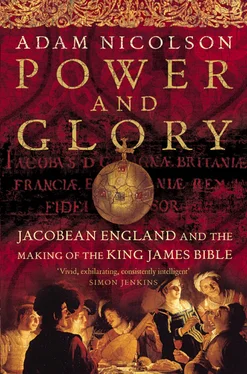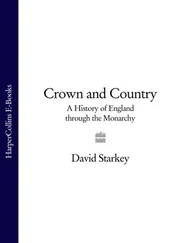Into this fierce, overheated atmosphere, where the mild divisions in the Church of England were being whipped into extremity by the quick, intellectual, joky, combative, slightly unsocialised banter, argument and bullying of the king, egged on by the excited Bancroft, the first suggestion, the seed of the King James Bible, dropped. It came from John Reynolds, at the end of a long list of suggestions. The petitioning ministers he represented would like âone only translation of ye byble to be authenticall and read in ye churcheâ.
In another jotted-down account of the scene, Reynolds is more courteous: âMay your Majesty be pleased that the Bible be new translated?â Bancroft immediately slammed back at the idea: âIf every manâs humour might be followed, there would be no end of translating.â That is the voice of the instinctive authoritarian, happier with the status quo than with any possible revision of it, the voice of the bishop who at the Earl of Essexâs futile rebellion in 1601 had personally gathered a gang of pikemen around him, holding a pike himself, and had repulsed the slightly pathetic and misguided rebels at Ludgate, as they tried to enter the City of London.
James, though, was a more complex character than the fierce anti-Puritan bishop, and craftier. Without hesitation â or at least in Barlowâs crawling account, where the words read as if they have been tidied up after the event â the king turns Reynoldsâs suggestion on its head. Implicit in the Puritan divineâs request was a criticism of the official Elizabethan Bible, known as the Bishopsâ Bible after the bishops who had translated it in 1568. It was a royalist and anti-Puritan document, larded with a frontispiece showing Queen Elizabeth and her ministers presiding over a bishop-dominated church. It was a Bible of the hierarchy, not of the people, and no Puritan liked it. Puritans preferred the translation of the Bible made by Calvinist Englishmen in the 1550s in Geneva, the headquarters of Calvinism. The Geneva Bible came interleaved with a large number of explanatory notes, many of them explicitly anti-royalist. The word âtyrantâ, for example, which is not to be found in the King James Bible, occurs over 400 times in the Geneva text.
Reynolds was without doubt asking for a revision to the Bishopsâ Bible, probably in favour of the Geneva Bible which he would have used himself. That is the meaning of his phrase âone only translationâ, which also makes a subtle appeal to Jamesâs dream of unity. But James â and if Barlowâs account can be trusted, this is a witness to his quickness and sharpness â caught the suggestion and reversed it, âprofessing that he could neuer, yet, see a Bible well translated in English; but the worst of all, his Maiestie thought the Geneua to beâ. Barlow explains why: âWithal he gave this caveat (upon a word cast out by my Lord of London) that no marginal notes should be added â having found in them which are annexed to the Geneva translation ⦠some notes very partial, untrue, seditious, and savoring too much of dangerous and traitorous conceits.â
James was particularly exercised by the Geneva note at Exodus 1:19. It was an all-important passage, in his view, for understanding the nature of royal authority and the relationship between royal and divine instructions. It is also extraordinarily revealing about the difference between the Jacobean and the modern attitude to authority. In Ancient Egypt, Pharaoh had ordered the Jewish midwives to kill all the male children born to the Jewish people. The midwives disobeyed these royal instructions and saved all the baby boys. Pharaoh wanted to know why. âAnd the midwiues said vnto Pharaoh, Because the Hebrew women are not as the Egyptian women; for they are liuely, and are deliuered ere the midwiues come in vnto them.â
This was, of course, a lie. Jewish pregnancies came to precisely the same term as any other. The modern reaction would surely be to admire the midwivesâ courage in standing up to the Pharaoh and their presence of mind in telling a straightforward and quite convincing white lie. Their disobedience was brave and their deception clever. But the Genevan note ran as follows: âTheir disobedience in this was lawful, but their deception is evil.â
For James, their behaviour had been the essence of sedition. Their disobedience was wicked and their deception made it worse. It was clearly the midwivesâ duty to obey the royal instruction, to conform to the authority of the powers that be and to murder the babies. James would have been on Herodâs side and no royally sanctioned translation of the Bible could tolerate any suggestion to the contrary.
He expanded on what he would like the new Bible to be like.
His Highnesse wished, that some especiall pains should be taken in that behalf for one vniforme translation ⦠and this to be done by the best learned of both the Vniversities, after them to be reuiewed by the Bishops, and the chiefe learned of the Church; from them to be presented to the Priuy Councell; and lastly to bee ratified by his Royall authority; to be read in the whole Church, and no other.
Everything implicit in the conference and in the competing constituencies in the country at large; everything that had been building up since Sir Robert Careyâs ride to Edinburgh nine months earlier; and, in a wider way, everything involved in the long cultural revolution that had been rolling across Europe for the previous eighty-five years: all of that came to a point in Jamesâs response. Reynolds had wanted, when all the code was stripped away, a strict Puritan Bible, non-episcopal, the naked word of God, truly transmitted. And to that request James had said, in effect, âYes; I will give you the very opposite of what you ask.â A translation that was to be uniform (in other words with no contentious Geneva-style interpretations set alongside or within the text); with the learned authority of Oxford and Cambridge (which, at least in their upper echelons, were profoundly conservative institutions, both of which had sent to the king long and high-flown refutations of every point in the Puritansâ Millenary Petition); to be revised by the bishops (the very influence that Reynolds did not want); then given, for goodnessâ sake, to the Privy Council, in effect a central censorship committee with which the government would ensure that its stamp was on the text, no deviationism or subversion allowed; and finally to James himself, whose hostility to any whiff of radicalism this afternoon had been clear enough. And this ferociously episcopal and monarchist Bible was to be the only translation that could be read in church: âno otherâ. The treasured Geneva Bible would be forced to retreat into the privacy of peopleâs homes and could no longer be used for public preaching.
The deep paradox and lasting value of the King James Bible is its response to both Reynoldsâs and Jamesâs instincts. Once the cantankerous and oddly hysterical atmosphere of the conference had faded, the deeper and slower rhythms of Jacobean royal ideology took control. Those were the rhythms of Jamesâs better side. His troubled upbringing had shaped a man with a divided nature. Later history, wanting to see him as a precursor for his sonâs catastrophe, has chosen only the ridiculous aspects of James: his extravagance, his vanity, his physical ugliness, his weakness for beautiful boys, his self-inflation, his self-congratulatory argumentativeness. Some of that had been in evidence at Hampton Court. But there was another side to James which breathed dignity and richness: a desire for wholeness and consensus, for inclusion and breadth, for a kind of majestic grace, lit by the clarity of a probing intelligence, rich with the love of dependable substance, for a reality that went beyond show, that was not duplicitous, that stood outside all the corruption and rot that glimmered around him. These were the elements in James and in Jacobean court culture that came to shape the Bible which bears his name.
Читать дальше












